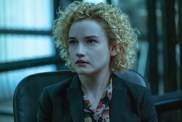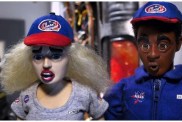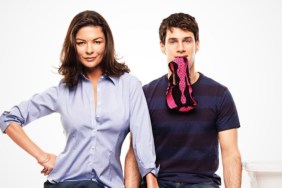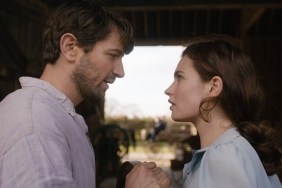When Alan Ball won the Oscar for his original screenplay for Sam Mendes’ American Beauty eight years ago, the movie world was his oyster, so it might have come as a surprise to some when he decided to continue doing television with his innovative series “Six Feet Under,” which ran for five years on HBO, winning 9 Emmys and 3 Golden Globes.
It’s been three years since the show ended and Alan Ball is back with two high-profile projects appearing in the next couple weeks. His long-delayed adaptation of Alicia Eran’s controversial novel Towelhead is finally getting a theatrical release, less than a week after his new HBO series “True Blood” premieres this weekend. You can read more about the latter over on ShockTillYouDrop.com, but Towelhead certainly has tongues wagging merely from the title, a derogatory term for Arabs. The story itself is quite provocative, the coming-of-age tale of a 13-year-old Arab-American girl named Jasira (newcomer Summer Bishil) who explores her burgeoning sexuality with an older neighbor (Aaron Eckhart) and a classmate, when she’s sent to the Houston suburbs to live with her critical and over-protective father (Peter Macdissi).
A year after the movie premiered at the Toronto Film Festival, ComingSoon.net finally had a chance to talk to Ball about some of the things explored in the film.
ComingSoon.net: How did you first find Alicia’s novel and what was your first reaction when you read it?
Alan Ball: My agent sent it to me. I actually had a screenplay ready to go out, it was a 1930 screwball comedy and my agent called me on a Friday and he said, “I’m sending over this manuscript for this novel that hasn’t been published yet. I think you should read it.” I read it over the weekend and I loved it. I loved it. I had such an emotional experience reading it. I really felt like it told that story in such a unique and inventive and human way, and I really understood the characters. It was a mix of tones which I liked and it was harrowing, it was hilarious, and it was heartbreaking. I think the most important thing for me was that as I got towards the end of the book, I was thinking, “Oh, this is not going to turn out good. This is not going to turn out good.” That showed me how emotionally I was invested in this girl and in her struggle. When it turned out okay I felt such a general sense of relief and happiness and that rarely happens to me when I read a book. I called my agent on Monday and I said, “I want to do this.” I optioned it with my own money because I knew that it would be crazy to try to develop at a studio, and I sort of went from there with the script on spec. Nobody wanted to do it so we financed it independently and then we sold it to Warner Independent in Toronto.
CS: It has similar elements to some of the themes you’ve explored on your own in “Six Feet Under.”
Ball: It spoke to me and certainly resonated with me and certainly similar themes and similar terrain.
CS: I was reading that you also wanted to keep the movie funny. Was there a lot of similar dark humor in the book?
Ball: It wasn’t that I wanted to make the movie funny, I just promised her that I would keep the humor that was in the book because the book is very funny. I assumed a lot of people were trying to get the option for this and later found out it was really just me, but I said, “I promise you I will keep the movie funny,” and she really liked hearing that.

CS: How did you end up finding Summer to play Jasira? It doesn’t seem like that are a lot of young actresses out there who could play this role.
Ball: I knew the movie sort of hung upon Summer and so we hired casting directors in New York, London, Australia, and Detroit, and Summer was living in Pasadena and her agent called her and she came into read. She had done a couple of TV shows and a movie for Disney or something like that, but I don’t think anything that really had the depth of what she did in “Towelhead.”
CS: How did you prepare Summer for this role? Obviously there are a lot of awkward sex scenes, and things she’s never done before.
Ball: She came into it totally prepared. She knew what she was getting into and she knew it was the role of a lifetime, so she had done a lot of thinking and she’s a very smart, very self-possessed young woman. She was honest from day one. It wasn’t that I had to coax the performance out of her at all. She was ready to go there. And we took really good care of her. Her mother was on the set every day and we used a body double. So she was totally taken care of.
CS: You mentioned you financed this yourself, so was it hard to get people to read the script and were they able to understand it right away?
Ball: We found a company, Indian Paintbrush, that really wanted to give us the movie, and they responded to it. I met a lot of people, but ultimately they were the right ones. I’m not going to lie, it was not an easy movie to get made, but every step along the way, the right thing happened.
CS: I know at one point it was called “Nothing is Private” and then it got changed back to the title of the book. I was curious about that decision.
Ball: Originally, we changed the name because we were scared because the title is a very ugly word and is very offensive to a large segment of the world’s population. But ultimately it’s the best title for the book and it’s the best title for the movie and we were just afraid, and then when Warner Independent bought us, they said, “You should just change it back to what the book was titled.” I called Alicia Erian who wrote the book and who was half Egyptian, and I said, “We’re going to change it back to the title of the book,” and she was very happy. I said, “I’m going to get a lot of grief about this because I know I’m the whitest man in America,” and she said, “Well you can blame me.”
CS: I know one critic who won’t see the movie at all because of the title. It’s just kind of strange.
Ball: That’s ridiculous. A person who won’t see the movie because of the title, they’re not really people that I want to reach.
CS: I thought the fixation on American flags was amusing, and I figured the story has to take place in 2003 or 2004, so was that something in the book?
Ball: It was in the book, that was all in the book, and I thought it was funny because people think if they just fly the flag, they’re patriots, even though they’re actually supporting invading other countries and dismantling our Constitution. So I thought it was really funny.

CS: I also thought the use of the doorbell to interrupt things that were about to happen was also very funny… also something from the book?
Ball: That was all in the book. I was very, very faithful to the book. The main thing I had to do in the adaptation was trim and cut it down. Also the book was written first person narration and I didn’t want to rely on narration in the movie, so I just tried to convey everything she was thinking and feeling visually. It really wasn’t that hard. Alicia did all the work. Alicia did all the heavy lifting.
CS: It also takes place in a very familiar setting, the suburbs, which like in “American Beauty,” we learn is one of the most places in the country. Any idea why that is?
Ball: “American Beauty” was not an indictment of the suburbs; “American Beauty” could’ve taken place anywhere. It just took place in the suburbs. Neither of these movies are meant to be indictment of the suburbs. I grew up in the suburbs and a lot of crazy stuff happens behind closed doors, but that happens everywhere. It happens in cities and it happens in rural areas. I’m not a big subscriber to the idea that I’m writing about suburban malaise. I’m writing about general malaise. I’m writing about cultural malaise.
CS: But there’ve been other novels that have been set there like “Little Children,” so why is there such a literary fixation with the setting?
Ball: It think that’s more a reaction to the idea that we have in our cultural consciousness of suburbia as a sort of pastoral place, where like from all those “Leave It to Beaver” and “My Three Sons.” When the suburbs were created it was sort of a refuge or a haven and I think no place is perfect. There’s always weird stuff going on under the surface no matter where you are in the world. I think maybe it stands out more because whenever there’s weird stuff going on the city you kind of expect it, but I think in the suburbs we think, “Oh, everything’s perfect and Mom and Dad and apple pie.”
CS: I’ve lived in the city for twenty years, and I feel like if I lived in the suburbs it would be peaceful and quiet, but then I see movies like this.
Ball: I live in the suburbs now. I’m a suburban guy.
CS: There you go. Obviously you’ve shown this movie at two festivals. Didn’t it play at ShoWest also?
Ball: I don’t know if it showed. I went there and I received an award. I can’t remember what the name of it was.
CS: I was curious what the reaction was like from people seeing it at those festivals, especially since the movie changed between Toronto and Sundance earlier this year.
Ball: Well I think the movie got better between Toronto and Sundance. The reception at Sundance was incredibly warm and positive and it’s actually been that way every other place I’ve gone. At Toronto, it was obviously very mixed, but it wasn’t quite finished. It wasn’t yet the movie that it wanted to be. I worked with the people at Warner Independent and they had some notes that were really, really helpful and helped me make it a better movie.

CS: Was there anything specific you can remember cutting out? (Note: Potential spoilers in the following paragraph.)
Ball: The things that we cut out, it wasn’t anything that was graphic or sexual or anything. It was more complicated stuff. Jasira and Thomas went into Zack’s house because Zack behaved like a little racist kid out in front of the house, and they went in to scare him, and then Mr. Vuoso came over and confronted Rifat and said, “Give us our key back,” and Rifat sort of exploded. And then Mr. Vuoso was like, “If you hit her, I’ll call protective services.” It was this great little scene of the guy who had actually molested Jasira standing up for her, but ultimately it took too long to get to the ending. The ending did not pack the emotional wallop that it does now because you were too exhausted. I’ll put all that stuff on the DVD, but I do think it’s a better movie without it.
CS: Before winning an Oscar for your first produced screenplay for “American Beauty,” you were mostly writing plays and for television. Most writers who win an Oscar would use that to leverage themselves more in the movie world but you decided to stick with television and were even more successful with that. Do you have a preference in terms of writing for movies or television at this point?
Ball: I don’t want to write a movie about comic book characters, I don’t want to write a movie about explosions, I don’t want to write a movie about machinery. Unfortunately, those are the movies that get greenlit and made and not the kind of work that I like to do which is writing about human beings dealing with really complex, moral issues. People aren’t really keen to make those kind of movies, but in TV, they’re more than happy to. I think before I moved into directing, as a writer, you have a lot more power in television. You can keep things on track, you can keep your vision to really have things be the way you want them to be and to have the story told the way you want it to be told. Also, I wasn’t ready to direct a movie after “American Beauty” and I knew it was such an amazing experience. I didn’t want to write some script and then get fired off the movie and have somebody rewrite it and then have it turned into something horrible. Another reason was because I had two years left on my TV development deal and I sort of had been cashing the checks and I had signed the contract, so I felt morally obligated to stick with that. But for me, “Six Feet Under” was film school. It really taught me a lot of skills that I didn’t have. So it brought me to a place where I was ready to direct.
Towelhead opens in New York and L.A. on Friday and expands to other cities on September 19. Ball’s new HBO series “True Blood” premieres on Sunday night, September 7, and you can read more about that over on ShockTillYouDrop.com.









